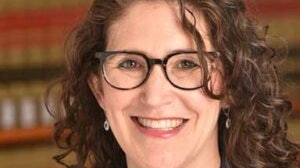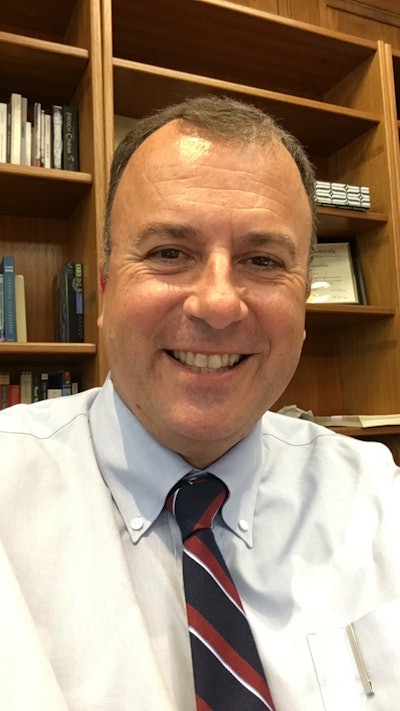 Michelle Deutchman
Michelle Deutchman
“One of the greatest threats [in the current fight] is academic freedom and state legislators trying to impose viewpoint-based laws around what can be taught at the university,” says Dr. Michelle Deutchman, executive director of the National Center for Free Speech and Civic Engagement at the University of California.
“Using legislation to try to impact the autonomy of universities is really dangerous,” she continues.
Deutchman points out that there is already a system for reviewing the work of academics and making sure no one is off track. She says peer review, while not perfect, is a much better form of faculty accountability than allowing “people who are not experts in these things, trying to make decisions about the things that underpin” the academic enterprise.
A trojan horse?
Among the latest major legislative pushes for free speech on campus came after the 2014 killing of Michael Brown in Ferguson, Mo., which sparked the “Black Lives Matter” movement. Then, arguments of free speech revolved around allowing speakers, like Milo Yiannopoulos and Charles Murray, to speak on campus to deliver messages many students opposed as incendiary, hate speech. The most recent reactions, involving faculty censorship and K-12 book bans, followed the 2020 killing of George Floyd in Minneapolis that spurred a resurgence in the movement.
“As we see movement towards certain issues, we see unfortunately a backlash,” Deutchman says. “Free speech is a lot about power dynamics. … As power dynamics begin to shift, people may be uncomfortable with that.” The problem, she says, is that “some people have bigger bullhorns than others.”
Aubre Conner, an attorney and lecturer on issues of academic freedom, free speech, and other education law issues at the University of California at Davis, says it is important to interrogate who is controlling the narrative around free speech.
“Individuals who felt like [the First Amendment] is supposed to be for them are trying to autocorrect the free speech conversation to again center them and center the white supremacist perspective to free speech, as opposed to taking an equity approach to free speech,” says Conner. She says an equity approach would mean that, to shift the conversation, there would need to be an action to allow for that conversation to take place. She says freedom of speech is most important for those whose lives have been marginalized, more than those who are used to having power.
“If we’re really going to center the people who need to be empowered to use free speech, these are the kinds of conversations, these are the free speech cases that should be front and center, not those who are trying their hardest to make sure historically excluded communities will continue to not have a voice about decisions that have been made over the last several centuries,” says Conner.
Deutchman is an advocate for freedom of all speech — including speech that may be deemed hateful — because “I think the whole idea is we don’t want the government to be deciding what is hateful,” adds Deutchman.
“They’re holding the mantle of the free speech flag, but ultimately the things they’re doing [are] chilling speech,” she says. “Tenure provides protection for people to be more free to create knowledge and share new ideas. … There’s this opus to say issues of equity, diversity and inclusion are competing at odds [with unrestricted free speech],” says Deutchman.
“Is there a push-pull between those two? Absolutely,” continues Deutchman. “Are they mutually exclusive? No. That’s where universities have to really lean in on their institutional values” and help students contextualize speech that might be uncomfortable for them.
Conner says individuals, and especially faculty members, must be careful when taking an absolutist approach to free speech — and the U.S. Constitution in general. An absolutist approach may perpetuate a perspective that is harmful to those who were excluded in the thinking, she says.
“Just looking at the Constitution just from a historical perspective, the First Amendment and the [Bill of Rights as a whole] were put in place without really any kind of recognition or acknowledgement that Black folks, or any folks from excluded communities, would ever be able to experience those rights,” says Conner.
“We continue to try to figure out what equal protection under the law even means,” she says. “When it comes to thinking about the speech that we feel like we need to defend, depending on who the party is, there’s typically always a choice … There’s not necessarily that same run to protect free speech when historically excluded communities are asking to have their speech protected and empowered.”
Conner says that even the courts have placed parameters around what types of speech should be protected; speech that is lewd, vulgar, or inciting violence is not protected under the First Amendment, for example. The key, she says, is to critically examine the values that are being communicated, and whether they advance the university’s overall goal of education.
Leaning into university values
 Alain-Philippe Duran
Alain-Philippe Duran
“We have this vision that the humanities should be a bit more of everything, and the skills that we teach in the humanities, things like critical thinking, empathy, adaptability, communication – essential skills, soft skills” — are really important to the free speech debate and helping students process what they’re hearing, says Durand, who laments that humanities are often “not a part of the conversation” around freedom of expression.
Durand says the humanities helps people receive information and different perspectives with the intent to understand. “What if all of these perspectives were presented and people learn that there can be different perspectives, but it can be done in a polite, respectful way,” he asks.
“The university is really the place where there can be this formative approach with the safety of the educators being there — a safe educational setting, where you can have those things being discussed and settled,” he says. “If you leave it up to social media for people to get educated on these things, that’s where I believe there is the problem.”
One of the things the humanities teaches, for example, is the ability to discern when language is being used for manipulation. Even nonfiction prose uses tone, perspective, and cherry picking of facts to present a picture that is beneficial to the storyteller, explains Durand.
“It’s not just about the ideas that you present, but also the people who are in the room who are going to be receiving these ideas, and you have to pay attention to them as well,” he says. And he points back to the mission of the university as well — “What are we trying to do here?” Durand asks. “Our objective is to educate. And at the end of the day, we want people to feel like they have learned something. … If we try to go with the inflammatory approach, people are just going to close off.”
This educational approach is largely about learning how to talk to each other, according to Deutchman. “Part of those skill sets is ‘we’re going to learn how to engage with people we don’t agree with,’” he says. “It’s a skillset, just like anything else, like calculus or learning how to write an essay.”
Aligning university priorities
Many colleges and universities have diversity, equity, and inclusion statements, and some have even revised their mission statements to include these as priorities. But faculty, staff, and students of color across higher ed may affirm there is still work to do around making these priorities a reality on many campuses.
College and K-12 campuses may rush to address the speech itself rather than the issues of inclusion and belonging, Conner says. “It’s one of those things where our campuses tend to feel like we can talk about campus inclusivity with somewhat of a cognitive dissonance of if we’re allowing everyone to come onto campus,” then the environment must be welcoming of them. But Conner says, “you can’t create an inclusive environment if students are constantly being bombarded with messages that are harmful and impact how they are made to feel about themselves as individuals.”
While it is important for faculty members to help students tackle tough conversations on campus within the safety of a university context, Conner points out that it is equally important to recognize that campus doesn’t always feel safe for all students.
“It’s hard especially for students who come from communities where they’re constantly having to see messages about not belonging in multiple facets of this country — that when they come to a space to learn, to learn about how they want to maneuver in the world, they’re not even welcome there,” she continues. “Just because free speech is allowed and can be helpful to the exchange of ideas, [doesn’t mean] the impact of those words, signs, messages – that you’re not human. You’re still going to feel that.”
Conner says it’s important for universities to make sure there are enough student counselors to handle any additional stress students might be facing because of speakers brought onto campus. If there aren’t designated free speech zones to house messages students may find harmful, there needs to be an intentional effort to make sure there are alternate paths for students to take to get to class, and trauma-informed resources and staff students can access — and that they know where and how to access those things.
“If your campus police budget is higher than the budget for student counselors and making sure all of your staff have trauma-informed training … then what as a campus are you demonstrating to students who come from communities where police don’t often represent situations of safety,” she asks. She says the question is especially applicable as campus police are often deployed when there are issues that come up on campus around free speech.
Conner says institutions should also understand that these issues can negatively impact enrollment, especially the diversity of the student population. “If schools want to really focus on diversity, this is something that needs to be taken into consideration … to retain and to keep students who are from historically excluded [communities] on your campus,” says Conner.
“At the core of everything is still a need for increased education — and not just for students, but for everybody about how the First Amendment works,” says Deutchman. “We have rights, and we have responsibilities, and there’s a whole conversation to be had about how you use those rights responsibly.”















